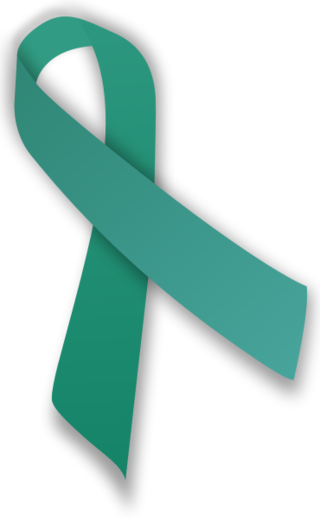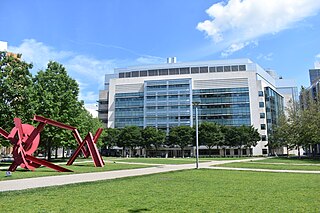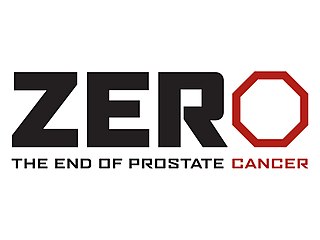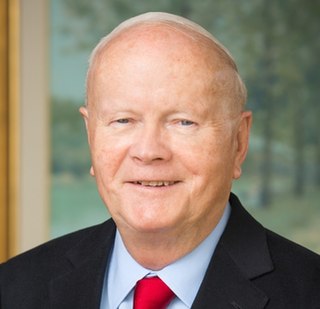Leland Harrison (Lee) Hartwell is former president and director of the Fred Hutchinson Cancer Research Center in Seattle, Washington. He shared the 2001 Nobel Prize in Physiology or Medicine with Paul Nurse and Tim Hunt, for their discoveries of protein molecules that control the division (duplication) of cells.

The University of Texas MD Anderson Cancer Center is a comprehensive cancer center in Houston, Texas. It is the largest cancer center in the world and one of the original three NCI-designated comprehensive cancer centers in the country. It is both a degree-granting academic institution and a cancer treatment and research center located within Texas Medical Center (TMC), Houston, the largest medical center and life sciences destination in the world. MD Anderson Cancer Center has consistently ranked #1 among the best hospitals for cancer care and research in the U.S. and worldwide, and it has held the #1 position 20 times in the last 23 years in U.S. News & World Report's Best Hospitals rankings for cancer care. As of 2023, MD Anderson Cancer Center is home to the highest number of cancer clinical trials in the world and has received more NCI-funded projects than any other U.S. institute. In 2024, Newsweek placed MD Anderson at #1 in their annual list of the World's Best Specialized Hospitals in oncology.

Memorial Sloan Kettering Cancer Center is a cancer treatment and research institution in Manhattan in New York City. MSKCC is one of 72 National Cancer Institute-designated Comprehensive Cancer Centers. Its main campus is located at 1275 York Avenue between 67th and 68th Streets in Manhattan.

Ludwig Cancer Research is an international community of scientists focused on cancer research, with the goal of preventing and controlling cancer. It encompasses the Ludwig Institute for Cancer Research, an international non-profit organization founded in 1971 by philanthropist Daniel K. Ludwig. The Institute is headquartered in New York City, with a European office located in Zürich. There are currently three Ludwig Branches: Ludwig Lausanne, Ludwig Oxford and Ludwig Princeton. In addition, there are six Ludwig Centers at leading institutions across the United States of America. Together, the Institute, Branches and Centers are known as Ludwig Cancer Research.

Moffitt Cancer Center & Research Institute is a nonprofit cancer treatment and research center located in Tampa, Florida. Established in 1981 by the Florida Legislature, the hospital opened in October 1986 on the University of South Florida's campus. Moffitt is one of two National Cancer Institute-designated Comprehensive Cancer Centers based in Florida. In 2021, U.S. News & World Report ranked Moffitt Cancer Center as a top 30 cancer hospital in the United States.

The Jade Ribbon Campaign (JRC) also known as JoinJade, was launched by the Asian Liver Center (ALC) at Stanford University in May 2001 during Asian Pacific American Heritage Month to help spread awareness internationally about hepatitis B (HBV) and liver cancer in Asian and Pacific Islander (API) communities.
Utkan Demirci is a tenured professor and a successful serial academic entrepreneur at Stanford University at the departments of Radiology and Electrical Engineering. He served as the Interim Division Chief and Director of the Canary Center at Stanford for Cancer Early Detection in the Department of Radiology.

The King Hussein Cancer Foundation (KHCF) and Center (KHCC) ,an independent Jordanian non-governmental, non-profit institution. It was established in 2001 by a royal decree issued and is led by Princess Ghida Talal. The foundation's mission is to combat cancer through awareness, prevention, and early detection programs, providing comprehensive care for cancer patients from Jordan and the Arab world, in addition to promoting research and innovation.

The Koch Institute for Integrative Cancer Research at MIT is a cancer research center affiliated with the Massachusetts Institute of Technology (MIT) located in Cambridge, Massachusetts, United States. The institute is one of seven National Cancer Institute-designated basic laboratory cancer centers in the United States.
The Pasqual Maragall Foundation is a private, non-profit foundation dedicated to scientific research of Alzheimer's disease. It was founded in April 2008 in Barcelona as a result of the public commitment of Pasqual Maragall, former Mayor of Barcelona and former President of the Generalitat de Catalunya, who had been diagnosed with this neurodegenerative disease in 2007. Its headquarters are located in the Ciutadella Campus of the Pompeu Fabra University in Barcelona.
The Asian Liver Center is a non-profit organization at Stanford University, United States, that researches the high incidence of hepatitis B and liver cancer in Asians and Asian Americans. The Asian Liver Center (ALC) was founded in 1996 to spearhead educational outreach and advocacy efforts in the areas of hepatitis B and liver cancer prevention and treatment, serves as a resource for both the general public and health practitioners, and implements clinical and research programs.

ZERO Prostate Cancer is a 501(c)(3) non-profit organization dedicated to prostate cancer education, testing, patient support, research and advocacy.

Jack Thomas Andraka is an American who, as a high school student, won the Gordon E. Moore Award at the 2012 Intel International Science and Engineering Fair with a method to possibly detect the early stages of pancreatic and other cancers. In 2018, as a junior majoring in anthropology and in electrical engineering at Stanford University, he was awarded the Truman Scholarship for his graduate studies.
Marvin Zelen was Professor Emeritus of Biostatistics in the Department of Biostatistics at the Harvard T.H. Chan School of Public Health (HSPH), and Lemuel Shattuck Research Professor of Statistical Science. During the 1980s, Zelen chaired HSPH's Department of Biostatistics. Among colleagues in the field of statistics, he was widely known as a leader who shaped the discipline of biostatistics. He "transformed clinical trial research into a statistically sophisticated branch of medical research."
Joann G. Elmore is a professor of medicine at the David Geffen School of Medicine, professor of Health Policy and Management at the UCLA Fielding School of Public Health Director of the UCLA National Clinician Scholars Program, the endowed chair in Health Care Delivery for The Rosalind and Arthur Gilbert Foundation, and a practicing physician. She publishes studies on diagnostic accuracy of cancer screening and medical tests in addition to AI/machine learning, using computer-aided tools to aid in the early detection process of high-risk cancers Previously, she held faculty and leadership positions at the University of Washington, Fred Hutchinson Research Center, Group Health Research Institute, Yale University and was the Associate Director and member of the National Advisory Committee for the Robert Wood Johnson Clinical Scholars Program at Yale and University of Washington. Elmore received her medical degree from the Stanford University School of Medicine, residency training in internal medicine at Yale-New Haven Hospital, with advanced epidemiology training from the Yale School of Epidemiology and Public Health and the RWJF Clinical Scholars Program. In addition, she was a RWJF generalist physician faculty scholar. Elmore is board certified in internal medicine and serves on many national and international committees. She is Editor in Chief for Adult Primary Care at Up-To-Date and enjoys seeing patients as a primary care internist and teaching clinical medicine to students and residents.

Helmy Eltoukhy is an American scientist and a businessperson who co-founded startups Avantome and Guardant Health. He is best known for his contributions to genomics, semiconductor DNA sequencing, and personalized medicine. His startups were acquired by Illumina in 2008. Avantome was founded to develop and commercialize semiconductor-based DNA sequencing, during the race for the $1,000 genome. Guardant Health was founded to pioneer non-invasive liquid biopsy approaches for cancer diagnosis, monitoring, personalized medicine treatment, and research.

A coronavirus breathalyzer is a diagnostic medical device enabling the user to test with 90% or greater accuracy the presence of severe acute respiratory syndrome coronavirus 2 in an exhaled breath. As of the first half of 2020, the idea of a practical coronavirus breathalyzer was concomitantly developed by unrelated research groups in Australia, Canada, Finland, Germany, Indonesia, Israel, Netherlands, Poland, Singapore, United Kingdom and USA.

Allison Walsh Kurian is an American medical oncologist. She is a Professor of Medicine and Epidemiology & Population Health at Stanford University and an oncologist at the Stanford Cancer Institute.
Amy Patrice Norden Skubitz is an American immunologist. At the University of Minnesota, Skubitz and her research team at the Ovarian Cancer Early Detection Program used new technology to test patients blood, leading to numerous findings.

Earle Meyer Chiles was an American businessman and philanthropist from the US state of Oregon. He was born into a wealthy and influential business family. Chiles attended Menlo College and then graduate school at Stanford University. He worked in his family's retail business in Oregon, including serving on the board of directors of Fred Meyer, a large retail company founded by his grandfather. He was also chief executive officer of Earle Chiles and Affiliated Companies and president of the Chiles Foundation. Over the years, he contributed financially to numerous educational institutions and non-profit organizations.












